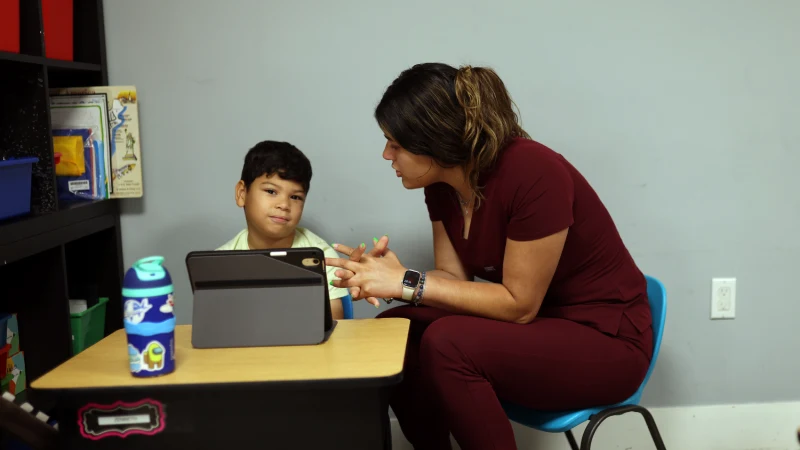Obsessive Compulsive Disorder and Autism Spectrum Disorder share certain characteristics that have traditionally caused a lot of confusion. Moreover, among parents seeking answers for their children’s behavior, these uncertainties can be even greater. Therefore, distinguishing between obsessive compulsive disorder vs autism can be challenging without an accurate diagnosis.
However, each of these disorders has unique traits in terms of symptoms and treatment. To help you understand the relationship between obsessive compulsive disorder vs autism, especially in the context of autistic children, this article will address their differences, diagnostic particulars, and the therapeutic options available in each case.
If you have ever wondered how to distinguish them or what the appropriate approach for your child’s treatment is, keep reading: here you will find the answers you need.
What is Obsessive Compulsive Disorder (OCD)?
Obsessive-Compulsive Disorder (OCD) is a condition characterized by intrusive thoughts known as obsessions, which generate anxiety and lead the person to engage in repetitive behaviors, known as compulsions. These obsessions are generally intrusive, unwanted images or impulses that can often be disturbing.
Although some of these behaviors may seem normal, in severe cases they can affect the daily life of those who experience them. Additionally, these effects are more noticeable in childhood, as children have less control over these compulsive repetitions. In this section, we will explore the OCD symptoms and how to establish a clear distinction between obsessive compulsive disorder vs autism.
What is Obsessive-Compulsive Disorder (OCD)?
- Definition: It is an anxiety disorder characterized by recurrent thoughts and repetitive actions.
- Main Symptoms: Intrusive thoughts, the need to repeat actions, and hoarding unnecessary objects.
- Impact on Daily Life: It can limit concentration, socialization, and work or academic performance.
- Causes and Risk Factors: It may result from a combination of genetic, neurobiological, and environmental factors.
- Diagnosis: Requires a psychological or psychiatric evaluation based on symptoms and impact.
- Treatments: Include cognitive-behavioral therapy, exposure and response prevention (ERP), and pharmacological treatment.
What is Autism Spectrum Disorder (ASD)?

Autism Spectrum Disorder (ASD) is a neurodevelopmental condition that affects communication, social interaction, and behavior. It also involves significant difficulty in understanding social cues and interpreting non-verbal communication. ASD manifests in various ways and with different levels of intensity, making each case unique.
Over the years, there has been greater recognition of ASD, which has improved diagnostic criteria and therapeutic approaches. In this section, we will analyze what ASD is, its most common symptoms, and some intervention strategies that can enhance the quality of life for those affected, from the perspective of obsessive compulsive disorder vs autism.
What is Autism Spectrum Disorder (ASD)?
- Definition: It is a neurodevelopmental disorder that affects communication, socialization, and certain behavioral patterns.
- Clinical Manifestations: Difficulties in social interaction, special interests, and communication disruptions.
- Variability on the Spectrum: There is no single autism profile; it varies from severe difficulties to the development of certain skills.
- Causes and Risk Factors: A combination of genetic and environmental factors influencing its development is studied.
- Diagnosis: It is conducted through specific tests to assess cognitive development and social interaction.
- Treatment and Support: This includes behavioral therapy, personalized educational programs, and specialized medical interventions.
What are the similarities between OCD and Autism?

At some point in the diagnosis, Obsessive Compulsive Disorder and Autism Spectrum Disorder may seem like completely distinct conditions. However, we have already mentioned that they often share several traits that can lead to confusion. Both disorders involve, for example, difficulties in adapting to change and cognitive processing.
It is important to note that while OCD and ASD are distinct conditions, they can coexist, making diagnosis and treatment even more complex. Therefore, understanding these similarities not only helps differentiate between the two disorders but also facilitates the search for appropriate and differentiated treatment strategies.
In this section, we will analyze aspects of the comparison between obsessive compulsive disorder vs autism that generate doubts when making an accurate diagnosis:
- Repetitive behaviors: In both cases, individuals may exhibit repetitive actions such as words or gestures.
- Cognitive rigidity: Both in OCD and autism, difficulty adapting to new situations is common.
- Focus on specific details: People with OCD and ASD often excessively focus on certain details or patterns.
- Sensory sensitivity: They may involve sensory hypersensitivity, such as intolerance to certain textures, sounds, or lights.
- Difficulties in socialization: Both disorders can affect interaction with others and social difficulties.
- Need for control: In both cases, there may be a strong need to maintain control over their environment.
How do treatments for OCD and Autism differ?

Clearly, Obsessive Compulsive Disorder and Autism Spectrum Disorder require distinct therapeutic approaches due to their profound differences. Moreover, you should know an important fact: research suggests that there is significant coexistence between OCD and ASD. In fact, according to some studies, this can be around 17% of cases.
Furthermore, these studies have shown that autistic people are more likely to develop OCD and vice versa. Therefore, understanding how treatments vary is vital for finding solutions tailored to each condition. In this section, we select the most commonly used therapies in each case, always from the perspective of obsessive compulsive disorder vs autism:
How do treatments for OCD and Autism differ?
Therapeutic Approach:
- OCD is primarily treated with cognitive-behavioral therapy, modifying obsessive behavior patterns.
- Autism requires personalized approaches such as ABA Therapy to improve socialization and communication.
Medication Use:
- For OCD, selective inhibitors may be prescribed to reduce anxiety and compulsive symptoms.
- In autism, there is no specific medication, but drugs can be used to treat symptoms.
Routine Interventions:
- In OCD, the goal is to modify compulsive patterns and reduce the need for control.
- In autism, structured routines are established to help improve adaptation and emotional regulation.
Treatment Goal:
- In OCD, the focus is on reducing obsessive thoughts to improve quality of life.
- In autism, the focus is on optimizing social skills, communication, and autonomy.
Frequently Asked Questions about Obsessive-Compulsive Disorder vs Autism.
How can I tell if my child has OCD or autism?
OCD is characterized by obsessions that cause anxiety, while autism usually involves difficulties in social communication and rigid patterns of behavior.
Can a person have OCD and autism at the same time?
Yes, it is possible. Various studies indicate that up to 17% of people with autism also exhibit symptoms of OCD.
What type of therapy is most effective for childhood OCD?
Cognitive Behavioral Therapy (CBT), especially the Exposure and Response Prevention (ERP) technique.
What therapies are recommended for children with autism?
The most effective treatment is Applied Behavior Analysis (ABA), combined with speech therapy, occupational therapy, and structured educational programs.
How is OCD and autism diagnosed in children?
The diagnosis of OCD is based on clinical observation of obsessions and compulsions. For autism, specific developmental assessments and social interaction evaluations are used.
Obsessive Compulsive Disorder vs Autism: Accurate Diagnosis at Koala ABA & Learning Centers.
At Koala ABA & Learning Centers, we understand that Obsessive Compulsive Disorder and Autism share certain characteristics, but it is essential to recognize that they are distinct conditions with unique treatments. Therefore, identifying the differences between obsessive compulsive disorder vs autism is vital to providing each child with the appropriate support.
At Koala ABA & Learning Centers, we recognize the great importance of an accurate early Autism Evaluation. Our multidisciplinary team conducts personalized assessments, considering each child’s context. Certainly, an early diagnosis not only opens the door to effective interventions such as:
It also provides families with the guidance and resources necessary to effectively navigate their children’s educational process.
Contact us today! Take the first step towards a promising future for your child. At Koala ABA & Learning Centers, we are here to help you build that path together.



